I’m taking a personal look back at the top ten films in every year since the one I was born in. We’re up to 1979. I was cannonballing towards 8 years of age. Margaret Thatcher took power in the UK, setting the political tone for the next few decades. The Ayotollah Khomenei was restored to power in Iran. Sony released the first Walkman, and Philips demonstrated the compact disc for the first time. Usenet was created by a couple of college students who were either very bored or very smart. Perhaps both. I might remember 1979 as a particularly drab year, but change was clearly afoot. And how was that reflected at the cinema, you ask? Let’s find out.
- Alien
- Nosferatu the Vampyre
- Apocalypse Now
- The Warriors
- Mad Max
- Stalker
- Escape from Alcatraz
- Moonraker
- Life of Brian
- Kramer vs Kramer
- Kramer vs. Kramer
- The Amityville Horror
- Rocky II
- Star Trek: The Motion Picture
- Apocalypse Now
- Alien
- 10
- The Jerk
- Moonraker
- The Muppet Movie
Only four movies appear in both lists this year, which again demonstrates how our tastes change in retrospect and when marketing hype is removed from the equation. To be honest the biggest surprise to me is seeing Moonraker in the IMDB top ten as I didn’t think anyone remembered that entry with great fondness. That said, the suspiciously high showing for Nosferatu does have me continuing to question the IMDB algorithm, Otherwise I think we have a pretty good spread of movies here, showing which titles had people queuing up at the box office in 1979, and which of those have stood the test of time.
Alien
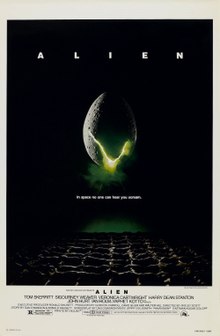
Alien was an incredibly important film. To me, personally. So much so that I couldn’t possibly summarize my relationship to the movie in a few paragraphs, so I’ve written an accompanying post.
However, Alien is an incredibly important film. Just as 2001 subverted what people expected of the sci-fi genre, and Star Wars then turned it all on its head again, so Alien reimagined what was possible with both the horror and sci-fi genres. Ridley Scott was hugely inspired by 2001 and Star Wars, but when crafting Alien he also looked to The Texas Chainsaw Massacre. The way the final movie transcends genres is surely one of the keys to its success.
Scott’s other secret weapon was a rich visual style rarely seen in movies at the time, and usually reserved only for the costliest epics—not for a script that was originally seen as little more than a cheap B movie, Writer Dan O’Bannon had introduced Scott to the nightmarish works of H.R.Giger, but the likes of Ron Cobb, Chris Foss and, of course, Scott himself collaborated to deliver cutting edge imagery that made space grimier, rougher and more terrifying than it had ever been imagined before.
Life of Brian
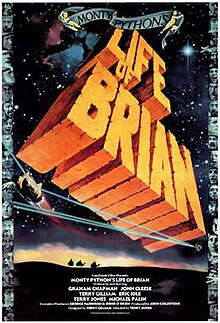
I will probably declare this the funniest movie ever made for the rest of my life. It’s, for me, the perfect blend of smart and stupid—drawing shamelessly from history, culture and religion, and yet unafraid to make a speech impediment the centre of perhaps the movie’s most side-splitting scene.
I definitely didn’t see this for the first time on its release, and I can’t even claim to have been aware of the vitriolic controversy that surrounded its release (incidentally, if you can find it, there’s an awesome dramatisation covering all of that called Holy Flying Circus).
It looks like Life Of Brian didn’t make it to home video until 1988, so it was probably sometime after that that I first saw it. I very likely had my own copy (literally: dubbed from the rental release). I remember watching it on the occasional afternoon, chuckling at the encounters between the various factions of the Judean Peoples’ Front. My eldest son has grown up with an appropriate taste for Monty Python. My youngest is now 13 and probably about ready to be introduced to this masterpiece.
Nosferatu
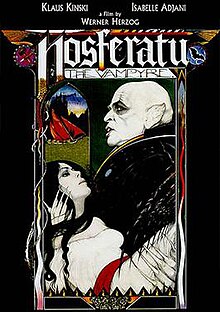
Considering I was quite the vampire fanatic growing up (thanks, Anne Rice) it’s a curious anomaly that I’ve only seen this movie once (to the best of my recall). In comparison to the Hammer movies, which I was somewhat more familiar with, it’s a slower, more obtuse piece of work. It’s probably something I’d really appreciate now—especially with Robert Egger’s more recent interpretation around to provide further contrast and comparison.
I’m particularly taken with the image of Klaus Kinski’s vampire in this movie—all teeth and pale skin, with the bald head further accentuating his otherness. I gather that Kinski wasn’t a fan of the bald cap and when he was invited back for a sequel (Vampire in Venice) he insisted on keeping his long grey-blonde hair instead. Which was an interesting choice and made about as much sense creatively as the rest of that film did.
Star Trek: The Motion Picture

My mother took me to see this on the big screen (this was likely in early 1980 as the film didn’t come out in the UK until mid-December 1979). I have no idea whether she wanted to see it, or if she thought I’d enjoy it but I don’t recall her being much of a Star Trek fan. I will say that, despite its reputation as the stodgiest of the Star Trek movies, it all came over pretty well at the time. I’ve never really forgotten the visuals—the creeping destruction that v’Ger wreaks on Klingons and humans alike; the scenes of Vulcan; the wormhole, even the finale. For a nine-year-old it didn’t really matter that the story lacked the fun and adventure of traditional Star Trek because it looked so damn good.
There are, obviously, far better Trek films. As a result I’ve only revisited this once or twice since that first viewing. I do have the newly remastered 4k, with updated special effects. Pretty sure I’ll give that a spin before too much longer.
Apocalypse Now
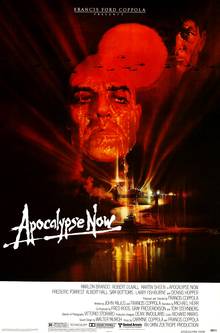
My earliest memory of Apocalypse Now was walking through the London Underground and seeing the posters everywhere (again, probably early 1980, given the release date). These were the days when movie posters weren’t just facile photoshop montages and often aimed more to convey the tone of a film than they did the characters, setting or plot. I had no idea what the film was about—I can’t even remember what I thought it might have been about—but I sure remember the title and the poster.
I rewatched Apocalypse Now a few years ago. I felt that I’d never given it a fair viewing and I’m still not sure whether I like the film or not. I certainly admire it, and it has more than its fair share of iconic scenes and unforgettable visuals. The opening scene, with the slow-motion napalm exploding in the jungle to the strains of “The End” by The Doors is, hands-down, one of my favourite movie openings ever. The final confrontation between Kurtz and Willard—brilliantly parodied by Buffy The Vampire Slayer and Tropic Thunder and, no doubt, dozens of others—has me breathless every time. The rest of the movie is a gorgeous, brilliant slog.
There have been a handful of different versions of Apocalypse Now released over the years, and the version I watched was “The Final Cut”. Somewhat annoyingly Francis Ford Coppola has done a bit of a George Lucas and made this the only version available on the 4k disc that I bought (I believe the other edits are still available on bu-ray). One of the major changes in this edit is a long ‘dinner scene’ set on a plantation that occurs towards the end of the movie. I looked up what the point of this scene was, as it seems to stop the movie dead in its tracks, and to be completely honest I’ve already forgotten.
The Jerk
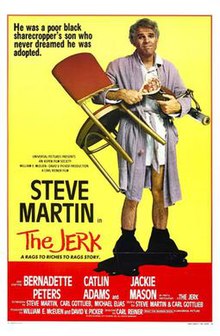
I have a definite soft spot for Steve Martin movies. I missed some of the earlier ones at the time (including this one) but for some reason absolutely adored Roxanne when I was devouring films during my teen years and made an effort to explore his earlier films (including All Of Me, The Man With Two Brains, The Lonely Guy and Dead Men Don’t Wear Plaid). The Jerk is probably my least favourite of that early era (I love dumb comedy, but this one was a bit too hit and miss). That said, there’s still quite a lot in this one that I remember fondly and Steve Martin always does a good job of injecting even his most idiotic character with a degree of pathos which helps give the audience something else to latch onto beyond dumb gags.
Amusingly I was about to relate one of my favourite scenes from this movie, only to realise it was actually from a completely different Steve Martin movie—The Lonely Guy—which I’d temporarily forgotten even existed. Thanks, memory!
Mad Max
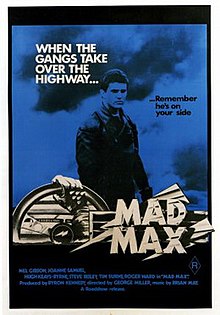
I’m firmly in the camp that views Mad Max 2 as a far superior movie to this first entry. I’ve seen Mad Max a handful of times, the first being on VHS at a friend’s house (I’m guessing it was a rental copy, but there’s an outside chance it could have been recorded off TV). There’s plenty about the movie that still sticks with me from that first viewing—the Toecutter is outstanding, the death of Max’s wife and child is horrifying and devastating, and Max’s revenge (particularly against Johnny the Boy, who I always thought looked a lot like Adam Ant) is both shocking and entirely expected.
Overall, though, it’s just a little too low-budget and indie for my tastes. That probably makes me sound like a bit of a snob but when you see what George Miller did with later instalments in the franchise (even Beyond Thunderdome has its moments) it’s hard not to view this as a faltering, experimental first effort that probably isn’t quite what Miller wanted it to be, but was the best he could do at that early point in his career.
Moonraker

Is this the low point of the Bond franchise? Sandwiched in between the two best Roger Moore Bond movies this was a poor and hasty attempt to cash in on the sci-fi boom generated by Star Wars. I do very much love the opening scene where a shuttle is hijacked while riding atop a 747 (yes, of course they would leave the shuttle fully fuelled in such a situation) but there’s very little else I remember fondly—and this was one that I saw at the cinema on its first release too!
As a young boy I’m sure the idiocy of firing laser guns in space and a British spy being able to manoeuvre a space shuttle with zero training was all good fun but I recall finding it all quite painful the last time I watched it. I can deal with laser guns and spaceships flying like ferraris in a Star Wars movie but, for all their ridiculousness, the Bond movies do have to keep one foot in reality. I suspect the producers agreed; opting for a much grittier tone with the follow-up entry.
Escape from Alcatraz
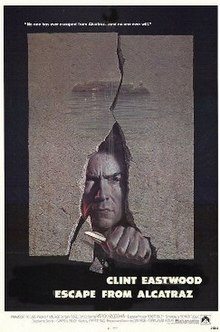
I’ve seen this at least twice. Once when it first aired on TV (one of those family weekend nights in front of the TV). I quite enjoyed it. Then I caught up with with again a few years later, perhaps it aired as part of the Moviedrome series, and recall it being a damn fine film—not a masterpiece by any means, but a solidly crafted … drama? thriller? I’m not sure.
Curiously the only two things I remember from the film are Mandela effect memories. The first is the prisoner who looks after a bird—which is likely me taking the same character from The Shawshank Redemption and matching it with ‘the birdman of Alcatraz’ (a true story that was also made into a film starring Burt Lancaster).
The second is the final scene of the inmates swimming away at night and the caption telling us that they were never found. A haunting final scene … that isn’t in the movie according to the synopsis. There is a caption, but it comes after the prisoners’ escape has been discovered.
The one thing that did stick with me—one of the prisoners lopping off his fingers as a protest—I’d forgotten about until reading the synopsis reminded me. That I’d forgotten I remembered it. Or something. What the feck, memory?
The unseen
While I’m not sure anyone would peg 1979 as an especially memorable year overall, it is interesting to see how many iconic movies it produced. I remember, for example, the hype surrounding Kramer vs Kramer at the time, and was traumatised by the scene (which I saw on a TV review) in which Dustin Hoffman frantically takes his son to emergency after a playground accident. Even the title became something of a media catchphrase. And yet I’ve still never seen it.
There was a lot of fuss around “10”, probably because of a strong British quotient and the presence of Bo Derek, who was marketed as cinema’s leading sex symbols of the day. The Amityville Horror is probably one of the best known horror films ever released, but I’ve never seen it (I did see the remake). Similarly, The Muppet Movie is much loved (perhaps not as much as The Muppet’s Christmas Carol) and proved against all odds that The Muppets could be as much of a force at the cinema as on the TV screen (I did love that show!)
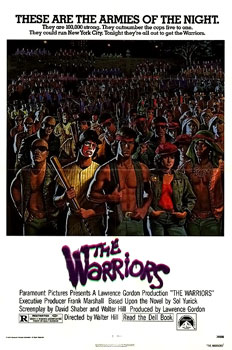
A lot of my peers would talk about The Warriors—and it’s just been reimagined in musical form by Lin Manuel Miranda—but I have yet to watch it. Also on the fighting front, Rocky II proved that Stallone’s franchise had legs (fists?) and, along with Jaws 2, demonstrated that Hollywood was getting quite the taste for sequels.
Of all of the unseen films, the only one I find myself intrigued enough by to add to my watch list is Stalker. I’m aware of Andrei Tarkovsky’s work but I’ve never seen any of it. Stalker sounds vaguely similar to Annihilation, which is among my favourite movies, so I’m quite keen to see it from that aspect, and also because it comes so highly regarded. Now, let’s see how long it takes me get around to that …
(Update: it took me longer to finally publish this post than it took me to watch Stalker! Very good film. Very long. Likely to be a separate post covering that and Roadside Picnic).
The Notables
Quite a lot of interesting films sitting outside the top ten(s) but I don’t want to be here all day so I’ll just cover three. Manhattan is a film I’ve long admired but, in all honesty, struggled to enjoy much. These days it simply comes across as creepy with Woody Allen spending the movie chasing a visibly younger woman. For all its artistic merits, I’m not sure I could bear to watch it today.
Meteor, starring Sean Connery battling a giant rock from outer space, is notable only for heralding the death of the disaster movie, something which we’ve seen reach both dizzying heights and depths through these 1970s blog posts. Several decades later the genre would be single-handedly revived by Roland Emmerich and continue to be just as ridiculous and entertaining.
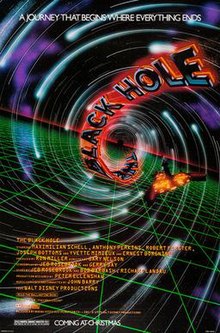
I do have to also call out The Black Hole, Disney’s attempt to cash-in on on Star Wars and provide space-faring entertainment for kids while also adding disembowelment, zombification, clinical insanity and a closing sequence of absolute nightmare fuel. Basically all the things that were widely agreed as being missing from George Lucas’s blockbuster movie. I was desperate to see this when it came out, begging my Dad to take me to see it, and one Saturday he simply led us up to the cinema and began queuing—just one of those fun ways that parents like to surprise their kids. I remember enjoying it enough to buy the annual (which included a sort of sequel comic strip), while wishing I had enough money to buy the toys that also got released.
UK top ten
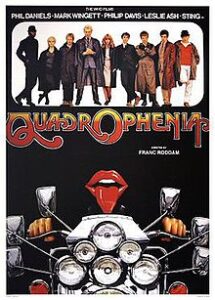
- Moonraker
- Rocky II
- Every Which Way But Loose
- Alien
- Life of Brian
- The Bitch
- Quadrophenia
- Star Trek: The Motion Picture
- Halloween
- The Deer Hunter
In truth not a whole lot to note from the UK Top Ten this year. A couple of late showings for Halloween and The Deer Hunter, and the year’s Bond movie proving as popular as always with UK cinemagoers. The UK film business gets a decent look-in too with Quadrophenia and The Bitch comfortably in the top ten. It’s funny to look back on how UK movies when I was growing up always seemed to veer between two extremes: tawdry comedies that were borderline soft porn; and gritty council estate realism. I guess everything else was covered by the US releases.
Join me next time for the story of how the Village People stormed the box office** and became cinema icons!
(**checks notes …)
